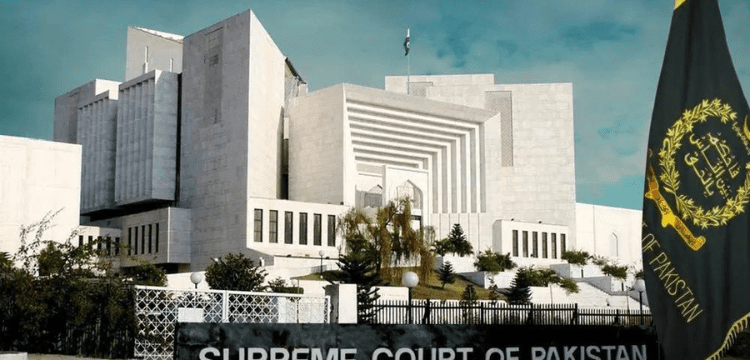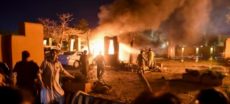[vc_row][vc_column][vc_column_text dp_text_size=”size-4″]ISLAMABAD: The Supreme Court resumed hearing Pakistan Tehreek-e-(PTI) Insaf’s petition against the Election Commission of Pakistan (ECP) delaying polls for the Punjab Assembly on Wednesday, as the government moved to limit the Chief Justice of Pakistan’s powers (CJP).
A larger bench of five judges, led by Chief Justice Umar Ata Bandial and consisting of Justices Ijazul Ahsan, Munib Akhtar, Aminuddin Khan, and Jamal Khan Mandokhail, is hearing the case.
However, the proceedings were marred by ambiguity regarding the earlier apex court decision of March 1, as one of the five-member bench’s judges, Justice Jamal Khan Mandokhail, stated unequivocally that the case was dismissed by a majority of 4-3 because the chief justice did not issue a “order of the court.”
Previously, Chief Justice Bandial overruled Attorney General for Pakistan (AGP) Usman Awan’s objection to the bench hearing the PTI’s petition as a “technical point” to be raised in a separate application.
Prior to that, Justices Syed Mansoor Ali Shah and Jamal Khan Mandokhail questioned the March 1 suo motu decision on elections in Khyber Pakhtunkhwa and Punjab, claiming that the proceedings were dismissed by a majority of 4-3, and claiming that the chief justice of Pakistan lacked the authority to restructure benches without the consent of the respective judges.
The Supreme Court is expected to rule on the case today.
Hearing
As the proceedings began, Farooq Naek, counsel for the Pakistan People’s Party (PPP), appeared before the court and requested that the party be added as a respondent to the case.
When asked if the application was made on behalf of the incumbent ruling Pakistan Democratic Movement (PDM), the lawyer stated that the PPP was not a member of the PDM.
The chief justice directed that the barrister for the electoral watchdog present his arguments first.
Also Read: CJP says, “Election commission had no right to postpone elections”.
In contrast, Justice Mandokhail stated that the Supreme Court’s March 1 decision regarding elections in Khyber Pakhtunkhwa (KP) and Punjab had been “dismissed” by four judges.
According to Justice Mandokhail, the verdict of the four judges in the suo motu case was the “order of the court,” and the chief justice had “not issued an order of the court.”
He questioned how the president could set a date for the election and how the ECP could issue an election schedule without an order. He referred to the four judges who had issued dissenting opinions in the suo motu case as his “brothers.”
The PPP’s counsel asked for a full court bench to hear the case, but Justice Mandokhail questioned why a full court should be summoned and stated that the case should be heard by the same seven-member bench.
However, Naek argued that the ongoing situation called for the formation of a full-court bench, adding that the nation was “confused”. He furthered that clarification was required regarding the SC’s March 1 verdict.
CJP Bandial told Naek to submit a written request in court.
The ECP’s lawyer, Sujeel Swati, came to the rostrum and was asked by Justice Mandokhail under what order had the ECP implemented the decision to announce election dates.
“The Election Commission has implemented the decision of March 1”, Swati stated, adding that after the court order, the ECP approached the president who gave the date of April 30.
He maintained that the schedule was released after fixing the election date and then preparations for the elections began. Swati highlighted that Article 218 of the Constitution held more weight than any other law.
According to Swati, the Constitution also mentions a favourable environment for elections, and elections should be held within 90 days, as per Article 224.
The chief justice commented on how well the ECP lawyer had prepared.
Swati went on to say that the decision was 3-2 and signed by five judges, according to the court order. He stated that the ECP read paragraph 14 and the first lines of the judgement before acting.
When Justice Mandokhail asked if the ECP saw the short order, Swati responded that the Commission may have misunderstood.
Also Read: Supreme Court has issued notices to respondents in Punjab polls delay case.
Justice Muneeb Akhtar stated that the decision was 4-3 nowhere in the dissenting note from March 1. He stated that the judges had the right to disagree.
“This minority is a law and cannot claim to be in the majority,” he said, adding that five judges heard the case in open court and signed the verdict.
Justice Mandokhail pointed out that the counsel did not answer his question, and stated that the short order contained dissenting notes and mentioned that Justice Jamal Mandokhail agreed with the decision of Justices Yahya Afridi and Athar Minallah.
“Did the judgments of Justice Yahya Afridi and Justice Athar Minullah dissolve in the air,” he questioned.
At this, th chief justice urged that matter that belongs to the court’s chambers should remain there.
Justice Mandokhail asked what position did the ECP take after the detailed decision. The CJP directed the ECP lawyer to continue his arguments.
Swati stated that the ECP made efforts to conduct fair and transparent elections and suggested election dates under Section 57. He further said that the court’s decision was received on March 3 and the ECP started implementing the decision according to its understanding.
“The Election Commission has to look at the right to vote and the security of the citizens,” Swati said, adding that the schedule was issued by the president.
Justice Akhtar stated that the ECP’s March 22 judgment was challenged and asked when it was issued. The ECP counsel replied that the order was issued on the evening of March 22 and nomination papers had already been received when the order was issued. He added that a few phases of the schedule had been completed by the time the order was issued.
According to Swati, the army refused to provide manpower to the ECP, citing the Constitution’s requirement that elections be held in a transparent, peaceful, and conducive environment. He informed the court that the ECP had requested security from the army, rangers, and the Frontier Corps.
Swati also claimed that agencies provided the commission with secret reports that could be shown in court. He stated that these reports revealed the presence of Tehreek-e-Taliban Pakistan (TTP) and other banned organisations in the Bhakkar Mianwali region.
According to the counsel, 412,000 personnel were requested for election security, but there was a shortage of 298,000 security personnel.
Justice Akhtar questioned if the ECP knew in February that elections should be held in October and highlighted that on the other hand, the ECP said it could not think of deviating from the court decision.
He further asked why the president gave April 30 as the election date if the election was to be held in October.
Citing the reports as background, Swati said that the ECP made its decision. He said that after the grounds were available, the commission held a meeting regarding the elections and added that the Ministry of Interior in its letter dated February 8 mentioned the law and order situation.
Justice Akhtar said that the ECP’s decision mentioned it required Rs25 billion to carry out the election but the court was told Rs25 billion yesterday, to which Swati said Rs5 billion were already released to the ECP.
He went on to say that the Ministry of Finance has said it will not be able to release funds for the election in the current fiscal year, and that the finance secretary has said it will be impossible to release Rs20 billion.
The CJP stated that the election was already scheduled for 2023 and inquired as to why there was no budget for the 2023 election in the fiscal year budget.
In response, the solicitor general stated that the budget for elections would be kept in the following fiscal year because it was unknown whether the provincial assembly would dissolve prematurely.
After the CJP inquired, the AG clarified that if elections were held throughout the country at the same time, Rs47 billion would be spent, but if elections were held separately, an additional Rs20 billion would be spent.
Swati stated that the special secretary of interior stated that political figures faced security threats, and that the Ministry of Interior stated that security threats would be present not only on election day, but also during the election campaign. He went on to say that the interior ministry also mentioned the attack on Imran Khan.
The commission’s counsel maintained that the electoral body was informed that providing security for the election without the deployment of the army would be “impossible.”
He further stated that the special secretary of interior said that peaceful elections could not be held in these circumstances and the country’s premier intelligence agency had alerted the commission that banned organisations had formed parallel governments in K-P.
Swati elaborated that 443 security threats were received in K-P during 2023, and there were 80 incidents of terrorism and 170 martyrdoms. He also claimed that according to confidential reports, it would take six to seven months to resolve the issues.
The chief justice stated that the ECP’s information was “serious” and questioned if they had brought it to the attention of the president.
“If you did not tell the president of Pakistan, you have made a mistake,” Justice Bandial said, adding that the date was given by the president on the advice of the ECP.
Swati further said that there were ongoing security operations in various areas of Punjab, to which the CJP stated that there was an operation every two to three days in the kutcha areas.
CJP Bandial asked regarding the timeframe of the completion of the operations, to which Swati replied that some operations would take up to six months to complete.
The counsel said that the ECP had no room to doubt the report of the agencies, to which Justice Akhtar replied that two assemblies had been dissolved.
The ECP’s lawyer reiterated that the facts stated in the reports of the agencies could not be ignored.
Justice Mandokhail questioned if there was a mechanism to verify these reports, to which the CJP said the issue of terrorism was present. Swati also replied that incidents were reported in the media.
The CJP said terrorism had been a problem in Pakistan for the past two decades, yet despite that, elections were held. He furthered that elections were held thrice during the 1990s ‘when communism and terrorism were on the rise’.
Justice Bandial added that the ECP suggested new dates without informing the president, however, Swati replied that the president wrote to the prime minister, not the ECP regarding the change of date.
The CJP stated that five incidents of terrorism took place in Punjab with the latest being the assassination attack on former prime minister Imran Khan.
Justice Akhtar questioned if the ECP would conduct the elections if the requisite institutions provided support. Swati stated that the ECP was ready to hold elections in Punjab if it received funds and support from other state institutions.
Justice Akhtar stated that the ECP called itself a “constitutional body” and it was the commission’s responsibility to conduct elections after two assemblies were dissolved. He added that every human life was precious and incidents of terrorism are serious.
He also urged that the court should turn to the Constitution to find a solution for the current circumstances.
Swati said that the ECP wrote a letter to the federal cabinet on March 20 and the cabinet supported the defense ministry’s stance in its reply. He continued that the cabinet said it could not approve the deployment of the army for the election and excused itself from providing funds to the ECP.
Justice Akhtar questioned why the ECP did not approach the court before making a decision and canceling the election schedule. Swati replied that the ECP followed court orders, to which Justice Mandokhail questioned where was the court order that was signed by all judges. Swati maintained that according to the electoral watchdog’s understanding, the decision was 3-2. The court then went for recess.
After the hearing resumed after a short break, with the attorney general and the ECP’s lawyer present at the rostrum, Swati stated that the commission’s October 8 date was not temporary.
He added that according to the security agencies, if elections were held in certain areas, they would become a target of terrorists.
“No fundamental rights are affected by the Election Commission’s responsibility to conduct elections,” he said, adding that it was the responsibility of the ECP to conduct elections with integrity.
Swati continued that conducting peaceful and transparent elections was also the responsibility of the ECP and added that security agencies had said that the “arrangements” would be completed during the time stipulated by the ECP.[/vc_column_text][/vc_column][/vc_row]











